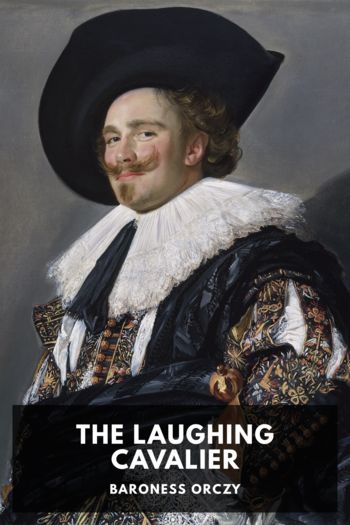The Laughing Cavalier by Baroness Orczy (best 7 inch ereader .TXT) 📕

- Author: Baroness Orczy
Book online «The Laughing Cavalier by Baroness Orczy (best 7 inch ereader .TXT) 📕». Author Baroness Orczy
After which there was silence between the two men. Beresteyn walked more rapidly along, his fur-lined cloak wrapped closely round him, his arms folded tightly across his chest and his hands clenched underneath his cloak. Stoutenburg on the other hand was also willing to let the matter drop and to allow the subtle poison which he had instilled into his friend’s mind to ferment and bring forth such thoughts as would suit his own plans.
He knew how to gauge exactly the somewhat vacillating character of Nicolaes Beresteyn, and had carefully touched every string of that highly nervous organization till he left it quivering with horror at the present and deathly fear for the future.
Gilda was a terrible danger, of that there could be no doubt. Nicolaes had realized this to the full: the instinct of self-preservation was strong in him; he would think over Stoutenburg’s bold suggestion and would find a way how to act on it. And at the bottom of his tortuous heart Stoutenburg already cherished the hope that this new complication which had dragged Gilda into the net of his own intrigues would also ultimately throw her—a willing victim—into his loving arms.
VII Three Philosophers and Their FriendsWhereupon Chance forged yet another link in the chain of a man’s destiny.
I pray you follow me now to the tapperij of the Lame Cow. I had not asked you to accompany me thither were it not for the fact that the Lame Cow situate in the Kleine Hout Straat not far from the Cathedral, was a well-ordered and highly respectable tavern, where indeed the sober merrymakers of Haarlem as well as the gay and gilded youth of the city were wont to seek both pleasure and solace.
You all know the house with its flat façade of red brick, its small windows and tall, very tall gabled roof that ends in a point high up above the front door. The tapperij is on your left as you enter. It is wainscotted with oak which was already black with age in the year 1623; above the wainscot the walls are whitewashed, and Mynheer Beek, the host of the Lame Cow, who is a pious man, has hung the walls round with scriptural texts, appropriate to his establishment, such as: “Eat, drink and be merry!” and “Drink thy wine with a merry heart!”
From which I hope that I have convinced you that the Lame Cow was an eminently orderly place of conviviality, where worthy burghers of Haarlem could drink ale and hot posset in the company of mevrouws, their wives.
And it was to this highly praised and greatly respected establishment that three tired-out and very thirsty philosophers repaired this New Year’s night, instead of attending the watch-night service at one of the churches.
Diogenes, feeling that three guilders still reposed safely in his wallet, declared his intention of continuing his career as a gentleman, and a gentleman of course could not resort to one of those low-class taverns which were usually good enough for foreign adventurers.
And thus did Fate have her will with him and brought him here this night.
Moreover the taproom of the Lame Cow wore a very gay appearance always on New Year’s night. It was noted for its clientele on that occasion, for the good Rhenish wine which it dispensed, and for the gay sight engendered by the Sunday gowns of the burghers and their ladies who came here after service for a glass of wine and multifarious relish.
As the night was fine, despite the hard frost, Mynheer Beek expected to be unusually busy. Already he had arranged on the polished tables the rows of pewter platters heaped up with delicacies which he knew would be in great request when the guests would begin to arrive: smoked sausage garnished with horseradish, roasted liver and slabs of cheese.
The serving wenches with the sleeves of their linen shifts tucked well up above their round red arms, their stolid faces streaming with perspiration, were busy polishing tables that already were over-polished and making pewter mugs to shine that already shone with a dazzling radiance.
For the nonce the place was still empty and the philosophers when they entered were able to select the table at which they wished to sit—one near the hearth in which blazed gigantic logs, and at which they could stretch out their limbs with comfort.
At Diogenes’ suggestion they all made hasty repairs to their disordered toilet, and readjusted the set of their collars and cuffs with the help of the small mirror that hung close by against the wall.
Three strange forms of a truth that were thus mirrored in turns.
Socrates with a hole in his head, now freshly bandaged with a bit of clean linen by the sympathetic hand of a serving maid: his hooked nose neatly washed till it shone like the pewter handle of a knife, his pointed cranium but sparsely furnished with lanky black hair peeping out above the bandage like a yellow wurzel in wrappings of paper. His arms and legs were unusually long and unusually thin, and he had long lean hands and long narrow feet, but his body was short and slightly bent forward as if under the weight of his head, which also was narrow and long. His neck was like that of a stork that has been half-plucked, it rose from out the centre of his ruffled collar with a curious undulating movement, which suggested that he could turn it right round and look at the middle of his own back. He wore a brown doublet of duffle and brown trunks and hose, and boots that appeared to be too big even for his huge





Comments (0)